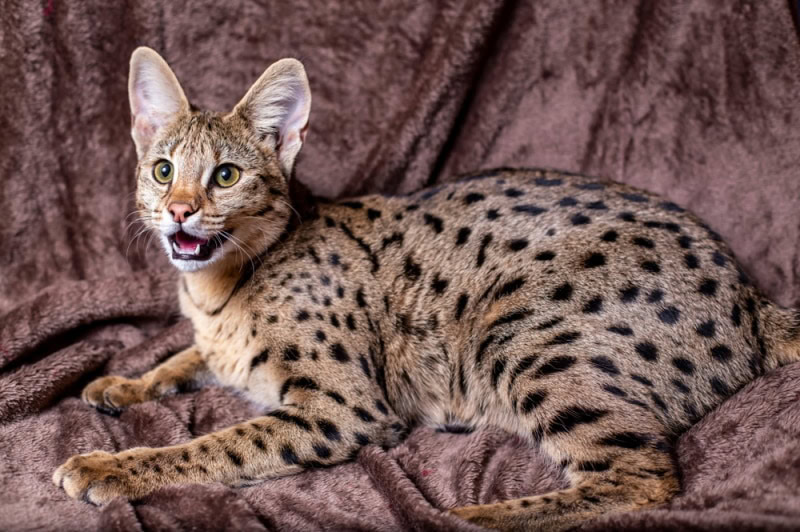VET APPROVED

The information is current and up-to-date in accordance with the latest veterinarian research.
Learn more »Click to Skip Ahead
One of the Savannah cat’s most striking features is their beautiful, spotted coat that can come in a variety of colors and patterns. The Savannah’s coat is also very easy to care for since it does not shed much and only requires minimal grooming to keep it in good condition. In this post, we’ll explore the unique characteristics of their coat, how to care for it, and whether it plays a role in making them hypoallergenic.

Savannah Cat vs Other Domestic Cat Shedding
There is not much of a difference between the Savannah and other shorthaired housecats’ shedding, but they don’t have a heavy undercoat and are considered moderate to low shedders.
Savannah cats shed a low to moderate amount of hair yearly, and their shedding can be easily managed with a good grooming routine. The savannah cat’s coat looks different than a domestic cat, which is why the amount of hair this cat breed sheds can be confusing for new owners.
Their coat closely resembles the wild African Serval that they share their genes with, consisting of a coarse coat with a layer of guard hairs and a softer undercoat. Both the topcoat and undercoat will shed regularly to the point that you will have hairs left on your clothes and hands if you pet them, although it is not as noticeable as in heavy-shedding cat breeds.
A savannah cat’s fur is typically short in length, depending on the cat’s generation and coat type, and they do not shed as much as long-haired cats. The short-haired hybrid savannah cats seem to have the least amount of shedding, especially if they are mixed with a domestic cat breed that is a low shedder.
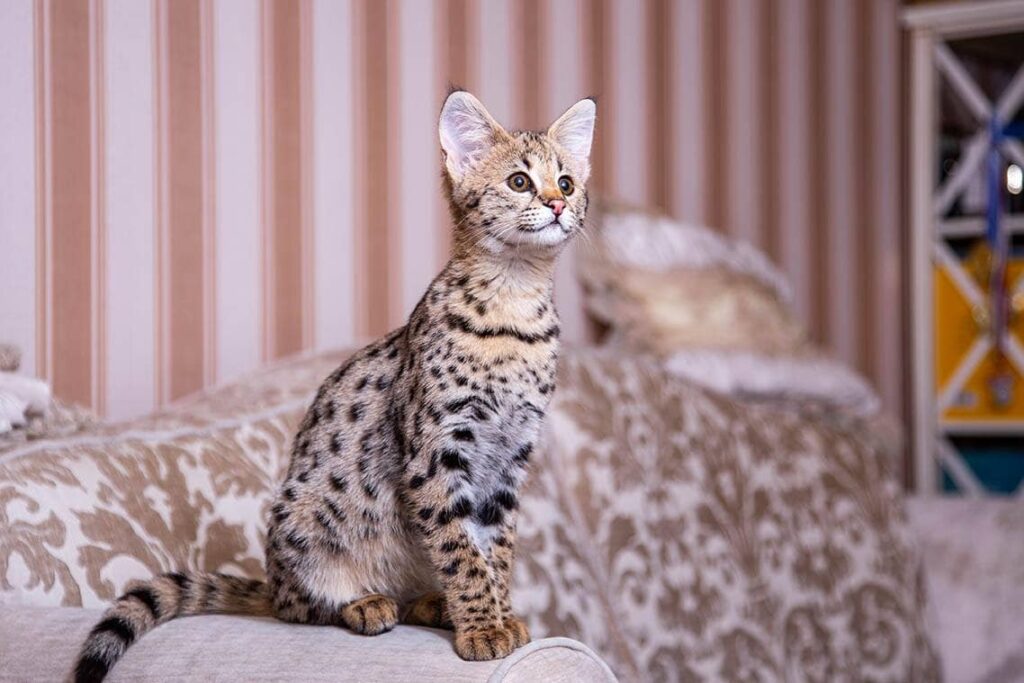
How Often Do Savannah Cats Shed?
Most Savannah cats shed year-round, but this increases during the shedding season. A Savannah cat isn’t known to be a heavy shedder, but certain factors such as diet, seasonal changes, and certain health conditions can cause your Savannah cat to shed more hair than usual. Prolonged temperature changes that occur throughout the seasons can cause your Savannah cat to shed more, usually during winter and summer.
Are Savannah Cats Hypoallergenic?
This question has stirred quite a bit of debate in the cat world, with some arguing that Savannahs are hypoallergenic and others arguing that they are not. Though Savannah cats don’t shed as much as some other cat breeds and are advertised as “hypoallergenic” by some breeders, this doesn’t mean that they won’t trigger allergies in susceptible people.
The term “hypoallergenic” is ultimately a marketing term used to describe a cat that is less likely to cause an allergic reaction because they don’t shed much, but all cats produce allergens, so there is no such thing as a hypoallergenic cat.
It’s commonly thought that allergies are triggered by pet hair, but this isn’t the case. Allergens are carried on hair and dander, tiny skin and hair scales that animals shed, and all cats shed dander, even hairless or low-shedding breeds. This includes the low-shedding Savannah cat.
For this reason, consider whether your allergies can be managed around a Savannah cat if you’re planning on acquiring one. Some people manage to minimize their allergy symptoms and live harmoniously with cats with thorough cleaning routines and other methods of reducing allergens around the home, like using an air purifier with a HEPA filter. However, others may find it impossible to live comfortably with a cat despite their efforts.
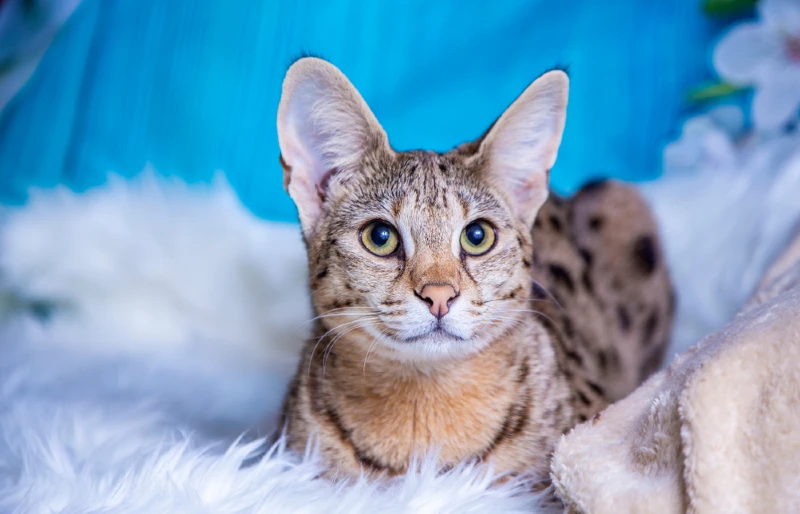
How to Care for a Savannah Cat’s Coat
The Savannah cat’s brushing needs are very basic. As a rule, you’ll only need to brush your Savannah cat’s coat once per week to keep it in good condition, get rid of dead hairs, and distribute healthy oils throughout the skin and coat.
During shedding seasons (spring and fall), your Savannah cat may shed a bit more than usual and you’ll likely see more hair around your home. Don’t be alarmed—as long as your Savannah cat is otherwise healthy, this is nothing to worry about. You might need to crack out the brush every day for a while, but, even during shedding season, a Savannah cat won’t shed a huge amount.
If you think your Savannah is losing an excessive amount of hair, however, or has started grooming excessively or displaying signs indicative of a skin condition (dryness, flakiness, redness, etc.), please take them to see a vet.
When you're grooming your own pet, choosing the right pet shampoo is half the battle. We recommend Hepper's Colloidal Oatmeal Pet Shampoo line because the all-natural, pet-safe formula does a great job of cleaning and moisturizing while avoiding irritation and itching. These soothing shampoos feature oatmeal and aloe vera and neither of them contain sulfates, phthalates, dyes, or soaps. Your pet will love this shampoo as much as you do! Now you just have to choose which one your pet will love best. Here’s a quick guide to help you choose the right option for your pet’s next bath!
| Image | Product | Details | |
|---|---|---|---|
For Bathing
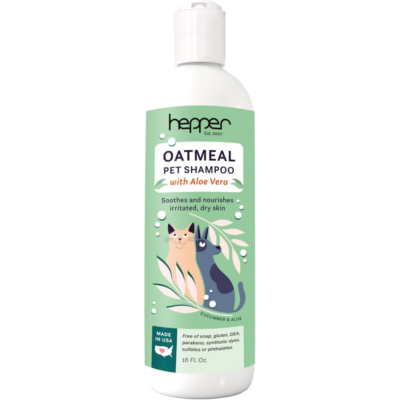 |
Hepper Oatmeal Pet Shampoo |
|
Check Price |
For In-Between Baths
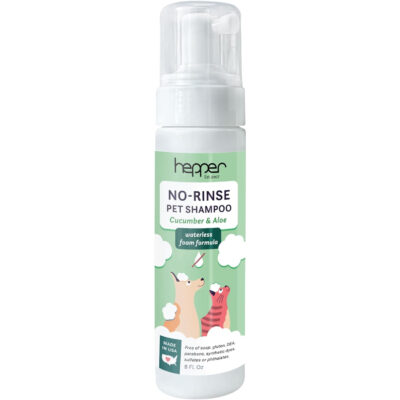 |
Hepper No-Rinse Pet Shampoo |
|
Check Price |
At PangoVet, we've admired Hepper for many years, and decided to take a controlling ownership interest so that we could benefit from the outstanding designs of this cool cat company!
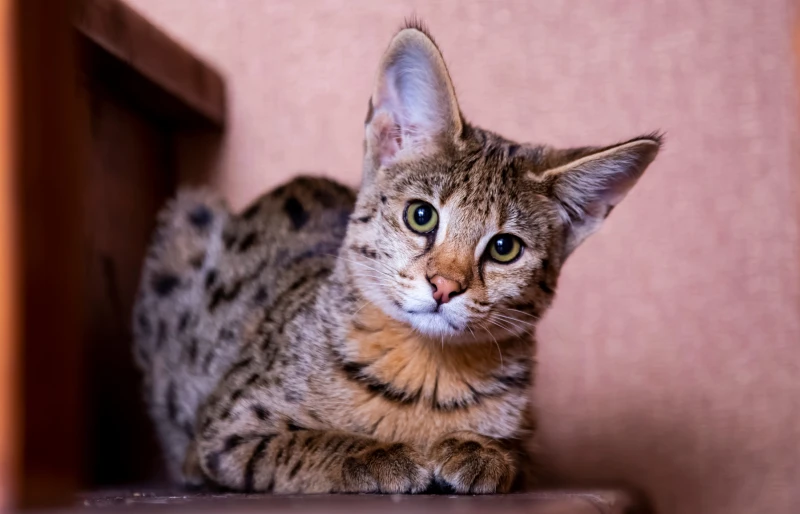
Savannah Cat: General Care Tips
“Grooming” is a term that many associate only with brushing and combing, but it’s an umbrella term for so many aspects of cat care. In addition to weekly brushing, here are some tips for keeping your Savannah cat healthy, active, and comfortable:
- Feed a high-quality, meat-based complete and balanced diet to help keep the coat healthy and support this active breed’s energy levels.
- Keep your Savannah cat’s nails trimmed as overgrowth can cause pain.
- If your Savannah cat’s ears need cleaning due to wax buildup or general debris, you can do this with a small cotton ball.
- Only clean your Savannah’s ears when necessary—too much ear cleaning can make matters worse.
- Get your Savannah cat used to accepting daily tooth brushing from as early on as possible.
- Make sure your Savannah cat gets plenty of exercise.
- Check your Savannah cat’s ears regularly to make sure they’re clean and free of discharge or odors. If you spot any inflammation or signs of an infection, get your Savannah checked by a vet.

Conclusion
Though Savannah cats can be a bit of a challenge in a few ways due to their high energy levels and need for a lot of attention, their coats are generally easy to care for as these cats don’t shed much, especially when compared to heavy-shedding breeds like the Persian and Maine Coon.
Nevertheless, it’s important to keep up with weekly brushing and other general care routines surrounding the nails, teeth, ears, and diet to make sure your Savannah cat has the best chance of a great quality of life.
- Related Read: Are Savannah Cats Dangerous? What You Need to Know!
Featured Image Credit: Kolomenskaya Kseniya, Shutterstock
